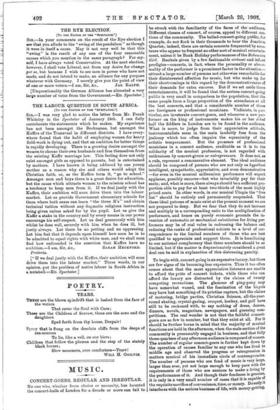THE LABOUR QUESTION IN SOUTH AFRICA.
[TO TUE EDITOR OP THE "SPECTATOR.1
SIR,—I was very glad to notice the letter from Mr. Frank Whiteley in the Spectator of January 24th. I can fully corroborate the statements which he makes. My experience has not been amongst the Bechuanas, but amongst the Kaffirs of the Transvaal in different districts. I have every- where found that the habit of employing women for heavy field-work is dying out, and that an ambition for better things is rapidly developing. There is a growing desire amongst the women to choose their own husbands and free themselves from the existing Kaffir marriage law. This feeling does not only exist amongst girls as opposed to parents, but is entertained by mothers. I have known it being adduced by one young mother as a reason why she and others would adopt the Christian faith, or, as the Kaffirs term it, " go to school." Amongst men and boys there is a great desire for education, but the cause which attracts women to the mission school has a tendency to keep men from it. If we deal justly with the Kaffirs, their ambition will soon drive them into the labour market. Let us provide Government elementary schools for them where both sexes can learn " the three R's " and obtain technical tuition without any dogmatic religious instruction being given unless asked for by the pupil. Let us give the Kaffir a stake in the country and by every means in our power encourage his self-respect. Let us deal generously with him whilst he does well, severely with him when he does ill, but justly always. Let there be no petting and no oppressing. Let him feel that it depends upon himself how soon he is to be admitted to equal rights with white men, and we shall soon find how unfounded is the assertion that Kaffirs have no
["If we deal justly with the Kaffirs, their ambition will soon drive them into the labour market." These words, in our opinion, put the problem of native labour in South Africa in a nutshell.—ED. Spectator.]










































 Previous page
Previous page